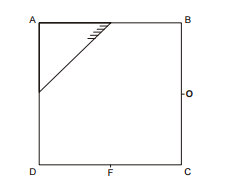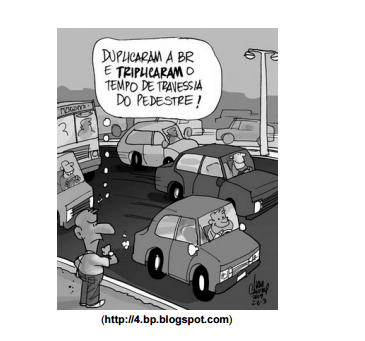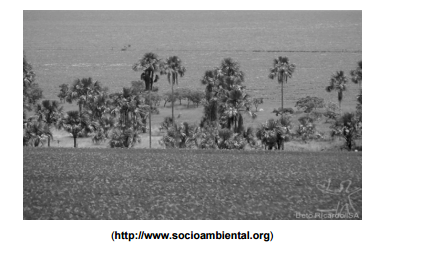Um corpo é lançado verticalmente para baixo, de uma altura de 60 m em relação ao solo, com velocidade inicial de 8 m/s.
Desprezando a resistência do ar, a altura do corpo, em relação ao solo, 2s após o lançamento, em metros, vale
Dado:
g = 10 m/s2
Em uma sala quadrada ABCD foi instalado um espelho plano vertical de forma que cada uma de suas laterais tocam as metades
das paredes AB e AD. Um observador O encontra–se no meio da parede BC, conforme mostra a figura.

Dentre os pontos B, C, D e F da figura, o observador O pode enxergar por reflexão no espelho
Dois resistores ôhmicos R1 e R2 podem ser associados em série ou em paralelo. Quando associados em série e ligados a uma fonte de tensão V, o resistor R2 dissipa uma potência duas vezes maior que R1. Se forem associados em paralelo e ligados à mesma tensão, a potência dissipada por R1 em relação à dissipada por R2 é
Tendo à disposição, em uma bancada de laboratório, uma bateria, fios de cobre, uma lâmpada e uma bússola, um professor pode comprovar
Segundo as Diretrizes Pedagógicas do Novo Plano Curricular, a avaliação deve ser vista como um
Ao trabalhar o tema "motor e gerador elétrico", o professor de Física deve considerar, entre outros aspectos, que esse tema
Observe a charge.

Com base no conteúdo da charge, o professor de Geografia do Ensino Fundamental pode iniciar o tema das redes de
circulação, discutindo
Observe a imagem a seguir.

Parece uma bela paisagem agrícola, não fosse o fato de estar situada no Parque Nacional Grande Sertão Veredas, que foi
criado, justamente, para a proteção de áreas de Cerrado em Minas Gerais. As áreas de Cerrado em Minas Gerais sofrem muitos
problemas ambientais, como
Considerando o contexto da Segunda Guerra Mundial e o avanço dos exércitos alemães na Europa, é correto afirmar que a situação apresentada no filme A Volta
Analise a tabela abaixo.

O desequilíbrio na distribuição de terras demonstrado na tabela pode ser apontado como um dos responsáveis pela
Attention: Read the text and answer questions 21 to 29.
A Writer's Beginnings in Kenya By ALEXANDRA FULLER
ONE DAY I WILL WRITE ABOUT THIS PLACE
A Memoir By Binyavanga Wainaina 256 pp. Graywolf Press. $24.
Dear reader, I'll save you precious time: skip this review and head directly to the bookstore for Binyavanga Wainaina's stand-upand-cheer coming-of-age memoir, "One Day I Will Write About This Place." [CONNECTIVE] written by an East African and set in East and Southern Africa, Wainaina's book is not just for Afrophiles or lovers of post-colonial literature. This is a book for anyone who still finds the nourishment of a well-written tale preferable to the empty-calorie jolt of a celebrity confessional or Swedish mystery. Not that Wainaina is likely to judge [PRONOUN] taste in books. In fact, at its heart, this is a story about how Wainaina was almost [TO EAT] alive by his addiction to reading anything available. "I am starting to read storybooks," he says of his 11-year-old self, growing up in Nakuru, Kenya. "If words, in English, arranged on the page have the power to control my body in this world, this sound and language can close its folds, like a fan, and I will slide into its world, where things are arranged differently." As he leaves childhood [ADVERB 1] − "My nose sweats a lot these days, and my armpits smell, and I wake [ADVERB 2] a lot at night all wriggly and hot, like Congo rumba music" − Wainaina retreats further from the confusing realities of politics and adolescence and his big multinational family (his father a Kenyan businessman and farm owner, his mother a Ugandan salon owner) and deeper into a world of words. At school he is told, and believes, that he is supposed to become a doctor or a lawyer, an engineer or a scientist. But Wainaina seems constitutionally incapable of absorbing anything that would further a career in these fields. By the time Wainaina leaves Kenya to attend university in South Africa, a country smoldering with the last poisonous fumes of apartheid, his addiction to books is complete. He drops out of school to pursue more completely a life of reading.
Adapted from http://www.nytimes.com/2011/08/14/books/review/one-day-i-will-write-about-this-place-by-binyavanga-wainaina-book-review.html?pagewanted=all)
The missing [CONNECTIVE] is
Attention: Read the text and answer questions 21 to 29.
A Writer's Beginnings in Kenya By ALEXANDRA FULLER
ONE DAY I WILL WRITE ABOUT THIS PLACE
A Memoir By Binyavanga Wainaina 256 pp. Graywolf Press. $24.
Dear reader, I'll save you precious time: skip this review and head directly to the bookstore for Binyavanga Wainaina's stand-upand-cheer coming-of-age memoir, "One Day I Will Write About This Place." [CONNECTIVE] written by an East African and set in East and Southern Africa, Wainaina's book is not just for Afrophiles or lovers of post-colonial literature. This is a book for anyone who still finds the nourishment of a well-written tale preferable to the empty-calorie jolt of a celebrity confessional or Swedish mystery. Not that Wainaina is likely to judge [PRONOUN] taste in books. In fact, at its heart, this is a story about how Wainaina was almost [TO EAT] alive by his addiction to reading anything available. "I am starting to read storybooks," he says of his 11-year-old self, growing up in Nakuru, Kenya. "If words, in English, arranged on the page have the power to control my body in this world, this sound and language can close its folds, like a fan, and I will slide into its world, where things are arranged differently." As he leaves childhood [ADVERB 1] − "My nose sweats a lot these days, and my armpits smell, and I wake [ADVERB 2] a lot at night all wriggly and hot, like Congo rumba music" − Wainaina retreats further from the confusing realities of politics and adolescence and his big multinational family (his father a Kenyan businessman and farm owner, his mother a Ugandan salon owner) and deeper into a world of words. At school he is told, and believes, that he is supposed to become a doctor or a lawyer, an engineer or a scientist. But Wainaina seems constitutionally incapable of absorbing anything that would further a career in these fields. By the time Wainaina leaves Kenya to attend university in South Africa, a country smoldering with the last poisonous fumes of apartheid, his addiction to books is complete. He drops out of school to pursue more completely a life of reading.
Adapted from http://www.nytimes.com/2011/08/14/books/review/one-day-i-will-write-about-this-place-by-binyavanga-wainaina-book-review.html?pagewanted=all)
The correct form of [TO EAT] in the above text is
Attention: Read the text and answer questions 21 to 29.
A Writer's Beginnings in Kenya By ALEXANDRA FULLER
ONE DAY I WILL WRITE ABOUT THIS PLACE
A Memoir By Binyavanga Wainaina 256 pp. Graywolf Press. $24.
Dear reader, I'll save you precious time: skip this review and head directly to the bookstore for Binyavanga Wainaina's stand-upand-cheer coming-of-age memoir, "One Day I Will Write About This Place." [CONNECTIVE] written by an East African and set in East and Southern Africa, Wainaina's book is not just for Afrophiles or lovers of post-colonial literature. This is a book for anyone who still finds the nourishment of a well-written tale preferable to the empty-calorie jolt of a celebrity confessional or Swedish mystery. Not that Wainaina is likely to judge [PRONOUN] taste in books. In fact, at its heart, this is a story about how Wainaina was almost [TO EAT] alive by his addiction to reading anything available. "I am starting to read storybooks," he says of his 11-year-old self, growing up in Nakuru, Kenya. "If words, in English, arranged on the page have the power to control my body in this world, this sound and language can close its folds, like a fan, and I will slide into its world, where things are arranged differently." As he leaves childhood [ADVERB 1] − "My nose sweats a lot these days, and my armpits smell, and I wake [ADVERB 2] a lot at night all wriggly and hot, like Congo rumba music" − Wainaina retreats further from the confusing realities of politics and adolescence and his big multinational family (his father a Kenyan businessman and farm owner, his mother a Ugandan salon owner) and deeper into a world of words. At school he is told, and believes, that he is supposed to become a doctor or a lawyer, an engineer or a scientist. But Wainaina seems constitutionally incapable of absorbing anything that would further a career in these fields. By the time Wainaina leaves Kenya to attend university in South Africa, a country smoldering with the last poisonous fumes of apartheid, his addiction to books is complete. He drops out of school to pursue more completely a life of reading.
Adapted from http://www.nytimes.com/2011/08/14/books/review/one-day-i-will-write-about-this-place-by-binyavanga-wainaina-book-review.html?pagewanted=all)
De acordo com o texto,
Attention: For questions 41-43, complete the dialogue with one of the options provided below: James: KK 41 to South Africa? Kate: Yes, I have. I KK 42 there about five years ago. James: Oh, really? What KK 43 it like? Kate: One of the most beautiful countries I’ve ever seen



